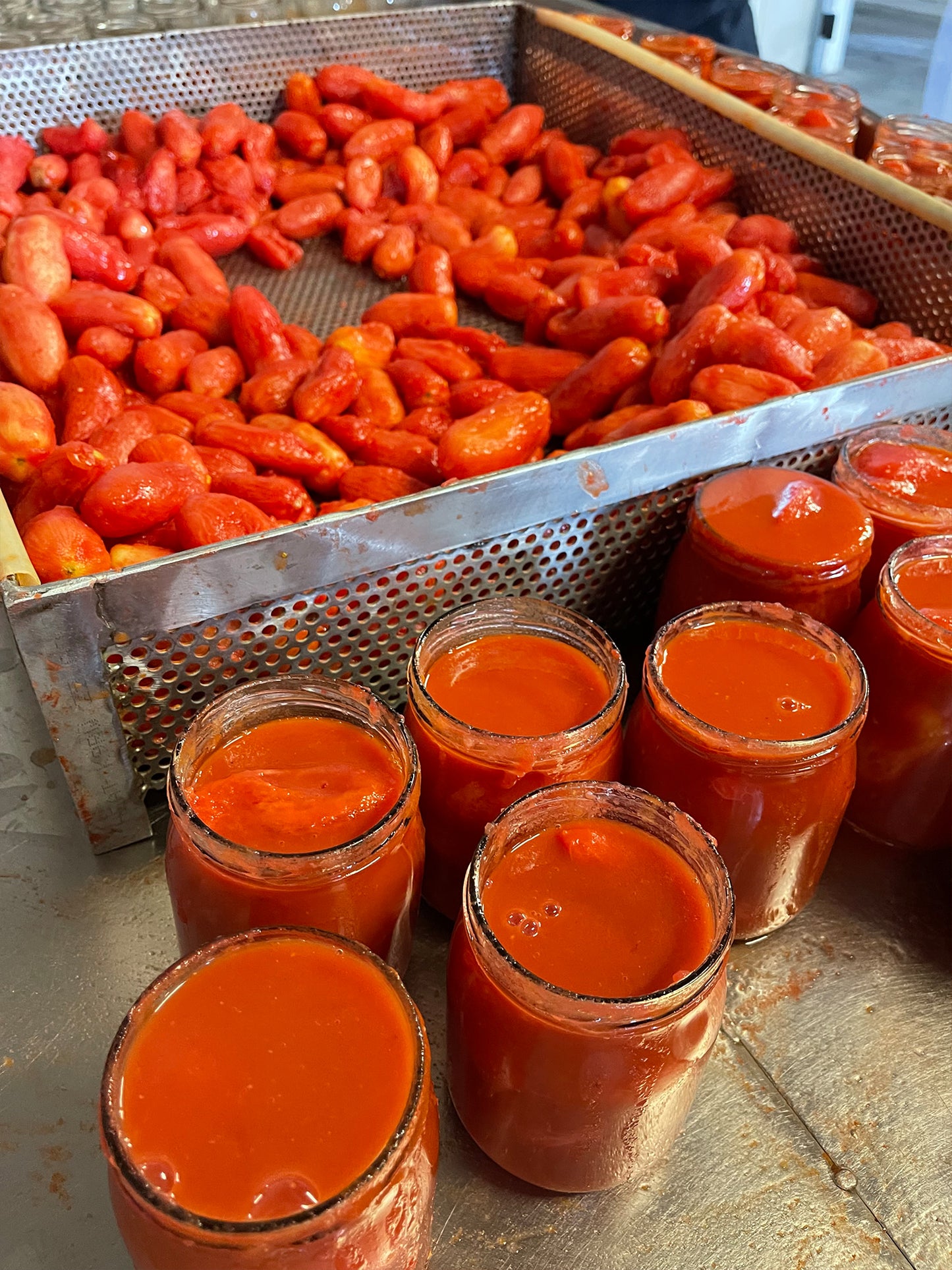1
/
of
4
Corbara Tomatoes - Sua Eccellenza
Corbara Tomatoes - Sua Eccellenza
Regular price
$16.00 USD
Regular price
Sale price
$16.00 USD
Unit price
/
per
Couldn't load pickup availability
Hand-peeled long Corbarino tomatoes in their natural juice. Grown in volcanic soil without irrigation, they offer a sweet, low-acid profile and silky texture. Perfect for refined sauces, seafood, or traditional Mediterranean dishes.
Share




 GEOGRAPHIC AND CULTURAL ORIGIN
GEOGRAPHIC AND CULTURAL ORIGINThe Corbarino tomato, native to the village of Corbara, is cultivated on the sun-drenched slopes of the Monti Lattari in the Campania region, just inland from the Amalfi Coast. This area enjoys a unique microclimate, with warm coastal air rich in iodine and mineral-laden volcanic soil. Often called a “son of the sun and fire,” the Corbarino has been a staple in the local food culture for generations, and is considered one of the hidden treasures of Italy’s rich agricultural biodiversity.
TECHNIQUE AND ARTISANAL CRAFTSMANSHIP
Cultivated in open fields without the use of greenhouses or artificial irrigation, the Corbarino grows with only rainwater and sun. These naturally resilient plants thrive in volcanic soil, which is rich in potassium and phosphorus, giving the fruit its distinct mineral character.
Harvested manually during a short two-month window in summer, the tomatoes are selected one by one based on shape, ripeness, firmness, and color. Processing follows traditional methods: tomatoes are preserved whole in their own juice, then pasteurized at a low temperature (98–100°C) to retain the full range of nutritional and sensory properties. This artisanal method preserves key compounds such as lycopene, beta-carotene, and pectin, ensuring both health benefits and rich flavor.
ORGANOLEPTIC AND NUTRITIONAL CHARACTERISTICS
Corbarino tomatoes are small, pear-shaped, and intensely red. Their natural flavor is a complex balance of sweetness and slight acidity, making them exceptionally versatile. Thanks to their high concentration of antioxidants—particularly lycopene—and their rich mineral profile, they are not only delicious but also support cellular health and disease prevention. Pectin naturally present in the skin helps sauces cling perfectly to pasta, and enhances their consistency in pizza toppings or stews.
CULINARY USE
Ideal for traditional tomato sauces, ragù, seafood pasta, pizza, or Mediterranean stews. The natural balance of sweetness and acidity makes them a go-to ingredient for chefs aiming to recreate authentic southern Italian flavors. Their low acidity also makes them suitable for delicate preparations like fish, shellfish, or light vegetable dishes.
 PRODUCERS
PRODUCERSFounded in 2006, I Sapori di Corbara is a family-owned company dedicated exclusively to the production and promotion of high-quality tomato preserves. Driven by deep-rooted passion and expertise, they work closely with local farmers, following the entire cycle—from seed selection and planting in trusted nurseries to field cultivation and hand-harvesting. Their uncompromising quality standards and artisanal approach have made them a benchmark for excellence, trusted by Michelin-starred chefs and culinary professionals worldwide.
TERRITORY
The Corbarino is cultivated between Corbara and the Monti Lattari, in one of the most ecologically unique regions of southern Italy. The area is known for its deep, soft, and porous volcanic soils rich in pumice and lapilli, which act as a natural reservoir for water and minerals. Terraced vineyards and tomato fields cling to steep hillsides, bathed in sun and kissed by sea breezes.
The climate, with limited rainfall in summer, long sun exposure, and cool nights, intensifies the flavor and aroma of the fruit. These unique conditions cannot be replicated elsewhere, making the Corbarino a true product of its terroir.
 The cultivation of Corbarino tomatoes follows low-impact, environmentally conscious practices rooted in tradition. By avoiding artificial irrigation, plastic greenhouses, and mechanized harvesting, the process respects the natural rhythms of the land. The volcanic soil’s drainage system and mineral richness reduce the need for chemical inputs, while the manual harvesting supports biodiversity and provides local employment.
The cultivation of Corbarino tomatoes follows low-impact, environmentally conscious practices rooted in tradition. By avoiding artificial irrigation, plastic greenhouses, and mechanized harvesting, the process respects the natural rhythms of the land. The volcanic soil’s drainage system and mineral richness reduce the need for chemical inputs, while the manual harvesting supports biodiversity and provides local employment.Processing methods avoid waste and energy overuse, ensuring the preservation of both the ecosystem and the culinary identity of the region. Each can of Corbarì tomatoes reflects a commitment to protecting both nature and tradition—preserving a piece of Campania’s cultural and agricultural legacy for future generations.
Collections
-

Extra Virgin Olive Oil
From the hills of Umbria to the countryside of Lazio, these extra...
-

Tomato Sauce
Grown in mineral-rich volcanic soil and ripened under the Southern Italian sun,...
-

Balsamic Vinegar
A true symbol of Italy’s culinary heritage, Traditional Balsamic Vinegar from Modena...









